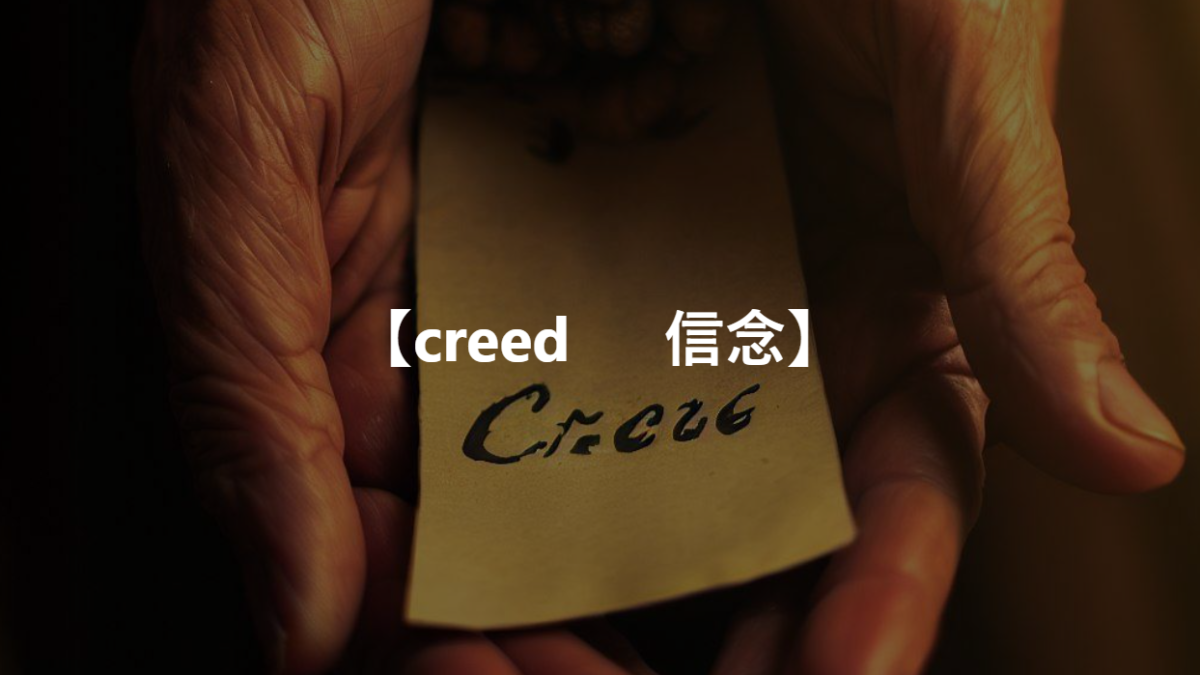【Creed 信念】という単語の語源とか由来を知っていますか?
「Creed」は、ラテン語の「credo」から来ており、「I believe」(私は信じる)という意味です。この言葉は中英語で「crede」または「creed」になり、最終的に現代英語の「creed」へと発展しました。「credo」はキリスト教の使徒信条(Apostles’ Creed)で使われることが多く、信条や信仰告白を指す言葉として用いられるようになりました。時が経つにつれて、「creed」は特定の宗教的信条だけでなく、個人や集団の基本的な信念や原則を示すためにも使われるようになりました。
The word “creed” originates from the Latin “credo,” meaning “I believe.” This term evolved into “crede” or “creed” in Middle English, eventually becoming “creed” in modern English. “Credo” is often used in the context of the Apostles’ Creed in Christianity, serving as a term for a statement of faith or confession of belief. Over time, “creed” has come to be used not only to refer to specific religious doctrines but also to describe the fundamental beliefs or principles of an individual or group.
この単語の類義語・反対語を教えてください。
類義語
- Belief: 信じること、信仰。特定の考えや宗教的信念を持つこと。
- Doctrine: 教義、教理。特定の宗教や哲学の基本的な原則。
- Faith: 信仰、信頼。宗教的信念や、何かを信じる強い感情。
- Philosophy: 哲学、思想。人生や宇宙に関する根本的な理論や態度。
- Principle: 原則、信条。行動の基準となる基本的な法則や信念。
反対語
- Doubt: 疑い。信念の不確かさや、何かを信じることへの不確信。
- Disbelief: 不信、信じないこと。特定の考えや主張を受け入れないこと。
- Skepticism: 懐疑主義。一般的に受け入れられている信念や理論に対する疑い。
- Uncertainty: 不確実性。確信が持てない状態や、決定的でないこと。
- Agnosticism: 不可知論。神の存在など、特定の真理について確かな知識が得られないという立場。
この単語に似た単語で間違いやすい単語はありますか?
- Creed vs. Belief:
- Belief(信じること)は、個人的な信念や考えを広く指す言葉であり、宗教的な内容に限定されません。一方で、Creedは特に宗教的な信条や、あるグループに共有される具体的な信念体系を指すことが多いです。
- Creed vs. Faith:
- Faith(信仰)は、宗教的信念や神への信頼を表す言葉で、内面的な信念の強さを強調します。Creedはその信仰を形式化したもの、つまり信仰の内容を具体的に表現した信条や教義を指します。
- Creed vs. Doctrine:
- Doctrine(教義)は、特定の宗教や哲学の公式な教えや原則を指し、しばしば組織的な枠組みの中で教えられます。Creedも教義を含むことがありますが、より広範な信仰の宣言や個々人が受け入れる信条に焦点を当てることがあります。
この単語にまつわるエピソードなどはありますか?
宗教的な信条や信念に関連するエピソードとしては、宗教改革者マルティン・ルターやキリスト教の使徒信条などが挙げられます。彼らは自らの信念を広め、教義や信仰体系を確立するために活動しました。
また、政治や社会の信条に関連するエピソードとしては、人権宣言や憲法の起草過程などがあります。これらの文書は、特定の価値観や信念を明確に表現し、社会の基本的な原則や権利を確立するために作成されました。
さらに、信条や信念の違いによって起きた宗教戦争や宗教間の対立なども歴史的なエピソードとして挙げられます。これらの出来事は、異なる信念や信条が衝突し、歴史的な影響を与えた例として注目されます。
「creed」は、人々の信念や信条に関連しているため、宗教や政治、社会におけるさまざまなエピソードや出来事と結びつけられることがあります。
As episodes related to religious creeds and beliefs, figures like the Reformation leader Martin Luther and the Christian Apostles’ Creed can be mentioned. They worked to spread their own beliefs and establish doctrines and faith systems.
Additionally, episodes related to political and social creeds include the drafting processes of the Declaration of Human Rights and constitutions. These documents were created to explicitly express specific values and beliefs, establishing the fundamental principles and rights of society.
Furthermore, religious wars and conflicts between religions caused by differences in creeds and beliefs are also notable historical episodes. These events are highlighted as examples where different beliefs and creeds collided, causing historical impacts.
The term “creed” is associated with people’s beliefs and creeds, thus it can be linked to various episodes and events in religion, politics, and society.
この単語を使った例文を5つほど教えてください。
Freedom and equality are the guiding principles of our creed.
(自由と平等は私たちの信念の指針です。)
The company’s creed emphasizes integrity and customer satisfaction above all else.
(その企業の信条は、誠実さと顧客満足を最優先としています。)
His creed is to always treat others with kindness and compassion.
(彼の信念は、常に他人を親切と思いやりで扱うことです。)
The athletes recited the team creed before each game, reminding themselves of their shared values and goals.
(選手たちは試合前にチームの信条を唱え、共有の価値観や目標を思い起こしました。)
The political candidate outlined her creed during her campaign, outlining her core beliefs and policy priorities.
(政治候補者は選挙戦中に自身の信条を明確にし、自身の核心的な信念と政策の優先順位を示しました。)
【creed 信念】のコロケーション
- Personal creed: 個人の信念。個人が自ら定める、人生や行動の指針となる信条や原則です。
- Religious creed: 宗教的信条。特定の宗教団体や信仰に基づく信念の体系を指します。これには、その宗教の教えや価値観が含まれます。
- Social creed: 社会的信念。社会やコミュニティが共有する価値観や原則です。これは、その集団の行動規範や目標を形成します。
- Political creed: 政治的信条。政治的なアイデンティティや立場を形成する基本的な信念や価値観です。これは、政治的行動や政策の選択に影響を与えます。
- Core creed: 核心信念。個人や集団が最も強く信じ、その行動や判断の基礎となる信条です。
「creed」(信念)は、個人や集団が持つ基本的な信条や価値観を表現する言葉です。人々の行動や思考、そして社会における立場を形成する重要な要素として機能します。以下に挙げる「creed」のコロケーションは、その多様な使用例とその背後にある意味を示しています。
まず、「Personal creed」は、個人が自ら設定する人生の指針や原則を指します。これは、個人の行動や決断を導く内部の信条であり、深い個人的な価値観を反映しています。
次に、「Religious creed」は、特定の宗教に基づく信念体系を表します。これには、その宗教の教義や、信者が共有する教えや価値観が含まれ、信者の生活や思考に深く根ざしています。
「Social creed」は、ある社会やコミュニティが共有する価値観や原則を意味します。これは、その集団のメンバーが共通して持つ行動規範や目標を示し、社会的な結束や方向性を提供します。
「Political creed」は、政治的なアイデンティティや立場を形成する基本的な信条や価値観を指します。これは、個人や集団の政治的行動や政策の選択に影響を与えるもので、政治的信念を明確にします。
最後に、「Core creed」は、個人や集団が最も強く信じている核心的な信条を意味します。これは、その他のすべての信念や行動の基盤となる、非常に重要な原則です。
これらのコロケーションを通じて、「creed」がいかにして人々の生活、社会、そして政治における基本的な信条や原則として機能するかが明らかになります。「creed」は、個人や集団がどのように自己同定し、どのように行動するかを定義するための指針を提供する重要な概念です。
The term “creed” represents the fundamental beliefs or values held by an individual or group, serving as a crucial element in shaping people’s actions, thoughts, and societal positions. The following collocations of “creed” illustrate its diverse applications and the meanings behind them.
Firstly, “Personal creed” refers to the guiding principles or standards set by an individual for their own life. This represents the internal beliefs that guide a person’s actions and decisions, reflecting deep personal values.
Next, “Religious creed” denotes the system of beliefs based on a specific religion. This includes the doctrines of that religion and the teachings and values shared among its followers, deeply ingrained in the followers’ lives and thoughts.
“Social creed” signifies the values and principles shared by a society or community. It represents the code of conduct and goals common among members of the group, providing social cohesion and direction.
“Political creed” points to the fundamental beliefs and values that form an individual’s or group’s political identity and stance. It influences political actions and policy choices, clarifying political convictions.
Lastly, “Core creed” means the most strongly held beliefs at the heart of an individual or group. These are the critically important principles that serve as the foundation for all other beliefs and actions.
Through these collocations, it becomes evident how “creed” functions as a fundamental set of beliefs or principles in people’s lives, society, and politics. “Creed” is a vital concept that offers guidance for how individuals or groups identify themselves and act, defining the directives that shape their existence and interactions.
creedを使った文法問題
- The company’s _____ is “Customer satisfaction is our top priority.”
- (A) creed
- (B) credulous
- (C) credible
- (D) credit
解答と解説: (A) creed
解説: creedは「信念、信条」という意味の名詞です。company’s creedで「会社の信条」という意味になります。
- The organization’s core _____ include integrity, honesty, and respect for others.
- (A) creeds
- (B) credulous
- (C) credible
- (D) credit
解答と解説: (A) creeds
解説: core creedsで「核となる信条」という意味になります。
- The politician’s personal _____ conflicted with the platform of his political party.
- (A) creed
- (B) credulous
- (C) credible
- (D) credit
解答と解説: (A) creed
解説: personal creedで「個人の信条」という意味になります。
- The religious leader urged his followers to remain true to their _____.
- (A) creed
- (B) credulous
- (C) credible
- (D) credit
解答と解説: (A) creed
解説: remain true to one’s creedで「信念を貫く」という表現になります。
- The ancient _____ of the tribe was passed down through generations of oral tradition.
- (A) creed
- (B) credulous
- (C) credible
- (D) credit
解答と解説: (A) creed
解説: creedは「信念、信条」という意味の名詞ですが、宗教的な「教義」という意味でも使われます。

